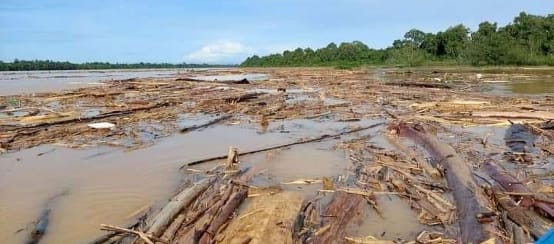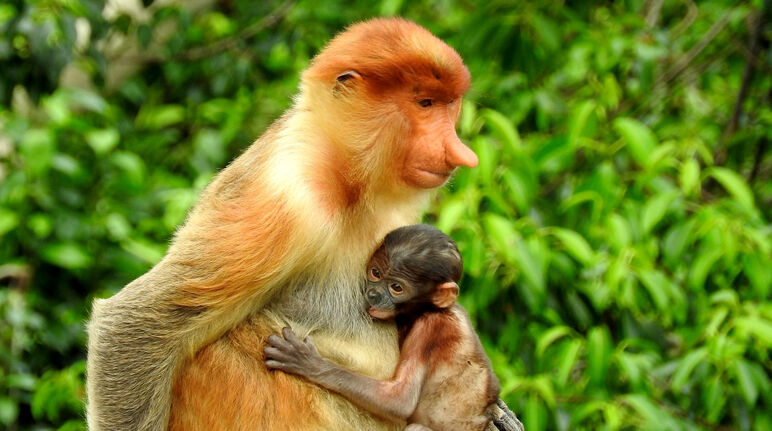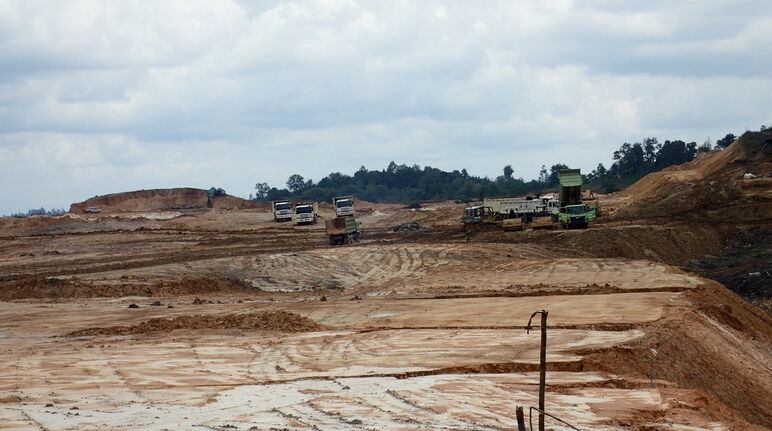Stop the destruction of Borneo's proboscis monkey forest!
Proboscis monkeys, clouded leopards, sun bears, hornbills, pangolins and other endangered species live at Balikpapan Bay on Borneo. The destruction of the coastal forest for a palm oil refinery and a biodiesel factory by First Resources Ltd is threatening the endangered wildlife. We call for an immediate stop of the construction work!
News and updates Call to actionTo: Lim Ming Seong, Chairman, Ciliandra Fangiono and Fang Zhixiang, CEO First Resources Ltd
“Stop the destruction of the proboscis monkey forest”
Balikpapan Bay is one of the most biodiversity-rich regions of coastal Borneo with a large population of the endangered proboscis monkeys (around 1,400 individuals), as well as other threatened species such as clouded leopards, sun bears, hornbills, pangolins and marbled cats. Furthermore, orangutans have been reintroduced into that area.
The endangered wildlife is currently losing its habitat – for the production of biodiesel and chemical products from palm oil. The Indonesian company PT Wahana Prima Sejati, a subsidiary of the multinational First Resources Ltd group, is currently clearing coastal forest on the beach of Sanro Mutti in order to establish another palm oil refinery and a biodiesel factory. Several dozen hectares of rainforest have already been cleared – the bulldozers left a dead moonscape behind.
Such destruction of biodiverse rainforest and vital habitat for proboscis monkeys as well as other threatened species is a violation of the Principles and Criteria of the Roundtable on Sustainable Palm Oil (RSPO). The parent company First Resources Ltd is a member of RSPO and already in 2015 pledged to eliminate deforestation and rights abuses from its supply chain. But its implementation remains insufficient, as the present example illustrates. The company needs to stop future clear-cutting and the construction work and instead arrange for the restoration of the valuable forest!
Please speak out against the destruction by signing our petition!
LetterTo: Lim Ming Seong, Chairman, Ciliandra Fangiono and Fang Zhixiang, CEO First Resources Ltd
Gentlemen,
I am shocked to learn that the Indonesian company PT Wahana Prima Sejati – a subsidiary of your enterprise First Resources Ltd – has already cleared several dozen hectares of high-biodiversity secondary forest on the eastern coast of Borneo to build to build a palm oil refinery, a biodiesel plant and related infrastructure. First Resources Ltd, as parent company and a leading palm oil plantation operator in Indonesia, is a member of RSPO and pledged to eliminate deforestation and rights abuses from its supply chain already in 2015. As the present case of PT Wahana Prima Sejati alarmingly illustrates, that pledge is not being kept:
Specifically, it is coastal forest at Sanro Mutti Beach (Area Pengunaan Lain) on the eastern coast of Borneo, where several dozen hectares of high conservation value forest have been cleared. The affected area is home to a vital and large population of proboscis monkeys, a species that is classified in the IUCN Red List as endangered. Furthermore, threatened species such as orangutans, clouded leopards, sun bears, hornbills, pangolins and marbled cats have been recorded in that area. While bushfires and deforestation for palm oil plantations have been the biggest threat to these rare animals in the past, the most serious threat now are infrastructure projects for the palm oil industry.
This destruction of high conservation value forest and habitat for threatened proboscis monkeys is a violation of the Principles and Criteria of the Roundtable on Sustainable Palm Oil (RSPO), specifically against the principle of environmental responsibility and conservation of natural resources and biodiversity. Any processing of palm oil in this refinery would not qualify for an RSPO certification. In addition, the deforestation is in breach with your own company’s guidelines.
I therefore urge First Resources Ltd to
1) prevent the building of the refinery by PT Wahana Prima Sejati
2) stop the building of the proposed biodiesel and oleochemical plants
3) arrange for the restoration of the deforested area.
Please pull the emergency brake and make reparations for the damage! I thank you for your efforts in this urgent case.
Yours faithfully,
In 2020, the company PT Wahana Prima Sejati (WPS) cleared 86 hectares of high conservation value rainforest. Local environmentalists filed a formal complaint with the parent company, First Resources. Our petition served to support the complaint.
In 2021, Pro Wildlife, SAVE and Rainforest Rescue protested with an open letter to the RSPO, calling for measures to be taken against First Resources such as a stop to the construction of its processing plants and requiring the land to be reforested.
In response to our criticism, First Resources claimed that the RSPO criteria only apply to oil palm plantations and mills. This case in the forest of the proboscis monkeys thus uncovered a glaring omission in the RSPO’s “principles and criteria”: The RSPO urgently needs to tighten them up to prevent copycats.
Thanks to our petition, protests and the formal objection, First Resources was required to remove its construction machinery in early 2021.
In December 2021, the RSPO adopted a resolution clarifying that the destruction of valuable forests is not only prohibited for oil palm plantations themselves, but that this also applies to the entire production chain, including processing plants and refineries.
In 2022, the company resumed clearing forest. We immediately alerted the RSPO, but more public pressure is needed.
In 2023, the Minister of Investment announced that Indonesia is planning a general amnesty for all illegal oil palm plantations. It would apply to around 1,200 plantations for which 3.4 million hectares of forest were illegally cleared. First Resources would also remain unpunished if the amnesty were to become legally binding.
Malaysia: logjam triggers environmental disaster

Even seasoned environmental activists were shocked by the scale of this disaster: A logjam has been clogging the Baleh River in the Malaysian state of Sarawak for days. Dead fish, a drowned deer and thousands of tree trunks can be seen in the photos sent by our partner Matek Geram. Loggers along the upper reaches of the river are responsible.
Satellite images debunk "sustainable palm oil" pledges
Rainforest destruction for palm oil remains a reality, and the perpetrators remain the same – that is the conclusion of an analysis of satellite image data from Indonesia, Malaysia and Papua New Guinea.
Brutality against Sarawak villagers – Covid lockdown hinders assistance
Indigenous people often suffer violence at the hands of thugs working for oil palm plantations. Our Malaysian partner Matek Geram sent us a frightening video showing several perpetrators beating up a young villager. Sarawak is currently in Covid lockdown, limiting the assistance Matek could offer.
Austria bans palm oil biofuel
Good news for the tropical rainforests and their inhabitants: As of July 1, 2021, Austria will no longer be counting fuel containing palm oil toward its renewable energy targets.
This petition is also available in the following languages:
Help us reach 150,000:












